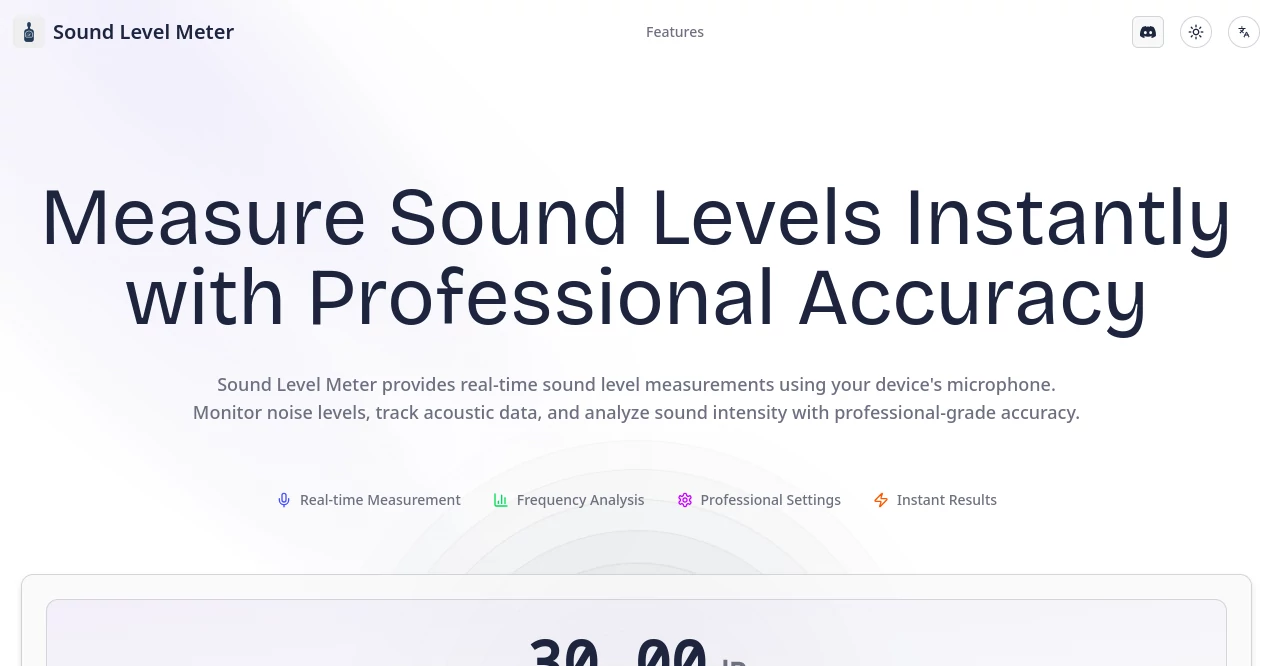🧠 AI Quiz
Think you really understand Artificial Intelligence?
Test yourself and see how well you know the world of AI.
Answer AI-related questions, compete with other users, and prove that
you’re among the best when it comes to AI knowledge.
Reach the top of our leaderboard.
Sound Level Meter
Professional Noise Analysis at Your Desk

What is Sound Level Meter?
Sound Level Meter brings the precision of studio gear right to your screen, letting you gauge and dissect audio surroundings with nothing more than your laptop's pickup. It's a handy ally for anyone chasing down racket levels or mapping out sonic landscapes, delivering breakdowns that help spot patterns and peaks without lugging around bulky kits. Those who've given it a spin often talk about how it cuts through the hum, turning vague worries into clear snapshots that guide better decisions.
Introduction
This online hub sprang up to fill the gap for folks who needed trustworthy ways to check sound without the hassle of specialized hardware. It took off among sound pros and everyday troubleshooters who appreciated its no-nonsense take on capturing decibels and frequencies. In a short time, it's gathered a crowd of users from quiet studios to bustling sites, all nodding to how it simplifies spotting the loud bits that disrupt flow. What draws people back is that blend of straightforward grabs and deeper peeks, making it feel like having a sharp ear in your pocket for those moments when noise sneaks up.
Key Features
User Interface
The screen lights up with a lively readout that puts the action front and center—a bold gauge for the now, flanked by bars for highs and lows that twitch in real time. Sliders for tweaks sit close by, inviting quick adjustments without hunting through layers, and charts unfold as you watch, tracing waves like a story unfolding. It's the kind of setup that clicks fast, even if you're more at home with notes than numbers, keeping the focus on what you're hearing rather than how to chase it.
Accuracy & Performance
It locks onto levels with a steadiness that holds up to pro eyes, pulling from solid math to match what you'd get from top-shelf boxes. Readings snap in without a lag, holding firm through steady drones or sudden spikes, so you trust the numbers even in the thick of things. Users who've cross-checked it against trusted setups swear by the close calls, noting how it keeps pace without drifting off course.
Capabilities
Beyond basic ticks, it breaks down the full spread—tracking mins and maxes alongside averages, while a spectrum view slices through pitches to highlight the culprits. Switch weights to mimic how ears really hear, or dial in offsets for spot-on calibrations that fit your setup. It logs runs over time, flagging trends that reveal the slow builds or sharp drops, all wrapped in visuals that make sense at a glance.
Security & Privacy
Your sessions stay local, with no uploads or shares pulling data elsewhere, keeping the whole thing between you and the tool. It runs light on the backend, wiping traces after each go, so you can measure freely without a thought to lingering echoes. That hands-off approach lets you dive in, knowing the quiet parts of your work remain just that.
Use Cases
Sound wranglers use it to baseline rooms before mixes, ensuring the space plays fair without hidden roars. Site managers check gear hums to keep things under wraps, dodging complaints before they brew. Homebodies map out neighborhood buzz, pinning down when the street wakes up for smarter routines. Even teachers bring it into lessons, letting kids chase echoes in class to grasp the science hands-on.
Pros and Cons
Pros:
- Grabs pro-level details without the weight of extra gear.
- Visuals make complex waves easy to follow and share.
- Quick starts mean you're measuring in seconds, not setups.
- Flexible tweaks keep it sharp for any spot or standard.
Cons:
- Tied to your device's ear, so built-in limits might nudge accuracy.
- No offline mode for spots without a steady line.
- Deeper dives could use more export paths for reports.
Pricing Plans
Everything opens up at no cost, covering the full kit from live reads to spectrum scans, so you jump in without a tab. It's built that way to spread the smarts wide, letting anyone from tinkerers to teams grab the goods freely. No tiers or traps—just pure access that keeps the focus on the sound, not the spend.
How to Use Sound Level Meter
Land on the page and grant the mic nod, then watch it kick off with the current hum right away. Poke the weights or offsets if your scene calls for it, and let it run to build the history line. Zoom into the spectrum for pitch chases, note the peaks and valleys, then snag a screenshot or jot for later. Reset for fresh starts, or tweak as the noise shifts to keep your read current.
Comparison with Similar Tools
Where app downloads demand space and setup, this web whiz slips in seamless, though those might pack more bells for mobile hunts. Against pricey hardware, it delivers close punches without the price tag, skipping the bulk for browser ease. It shines for quick, desk-bound checks where others drag with installs or costs, hitting that sweet spot for on-the-fly needs.
Conclusion
Sound Level Meter turns the invisible rumble into something you can see and shape, handing over the reins to measure what matters without the fuss. It's a quiet powerhouse that empowers everyone from pros to passersby to tune into their world a bit sharper. As sounds keep layering our days, this tool stands ready, proving you don't need fancy rigs to really listen.
Frequently Asked Questions (FAQ)
Does it work on any device?
Plays nice with desktops and laptops that have a mic, though phone tunes might vary by browser.
How do I get the best reads?
Stick close to the source and tweak the offset to match your setup for spot-on pulls.
What weights should I pick?
Go with A for everyday ears, C for raw power, depending on what you're chasing.
Can I save my logs?
Grab charts as images for now, with more save spots in the works.
Is it good for outdoor checks?
Holds up fine with a steady connection, but wind might whisper tricks—shield if you can.
Other , AI Research Tool , AI Analytics Assistant , AI Monitor & Report Builder .
These classifications represent its core capabilities and areas of application. For related tools, explore the linked categories above.
Sound Level Meter details
Pricing
- Free
Apps
- Web Tools
Categories
Sound Level Meter Alternatives Product
MidJourney

















